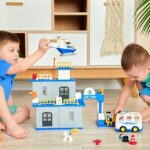In today’s fast-paced world, helicopter parenting seems to be soaring to new heights. Parents hover over their kids like a drone with a caffeine addiction, ready to swoop in at the slightest hint of trouble. While the intention is noble—ensuring their little ones’ safety and success—this constant surveillance can lead to some unexpected turbulence in a child’s development.
The risks of helicopter parenting are as real as that awkward high school dance. Overprotective parenting can stifle independence, create anxiety, and even lead to a lack of problem-solving skills. As children grow, they need room to stretch their wings and figure things out on their own. So, let’s dive into the not-so-funny fallout of this parenting style and explore how parents can strike the right balance between guidance and freedom.
Understanding Helicopter Parenting
Helicopter parenting involves parents closely monitoring and controlling their children’s lives to ensure safety and success. This approach, although well-meaning, often leads to significant drawbacks for children’s development.
Definition and Characteristics
Helicopter parenting is characterized by constant involvement in children’s activities and decision-making processes. Parents exhibiting this behavior often hover over their children, providing solutions before problems arise. Excessive worry about potential risks drives this behavior. Gradually, children may become dependent on their parents for guidance. This dependence reduces opportunities for independent thinking and can lead to anxiety when faced with challenges.
Historical Context
Helicopter parenting has its roots in societal changes over recent decades. In the late 20th century, increasing fears surrounding child safety emerged, prompting parents to take a more protective stance. The rise of technology and access to information reinforced anxiety surrounding children’s well-being. By the 2000s, the term “helicopter parent” gained popularity, reflecting a growing awareness of its impacts on child development. These historical shifts contributed to parents’ desires to shield their children from potential failures, even when such protections might impede their growth.
Psychological Risks
Helicopter parenting causes several psychological risks for children. These risks significantly affect their ability to develop autonomy and resilience.
Impact on Child Development
Child development suffers under constant parental oversight. Excessive intervention prevents children from facing challenges independently. This lack of experience stunts their problem-solving skills. Moreover, reliance on parents for decision-making hinders their critical thinking. Research indicates that overprotective parenting can lead to difficulty in forming relationships and trusting others. Children often struggle with self-esteem issues due to prolonged dependence. Exposure to everyday challenges is essential for acquiring life skills.
Anxiety and Stress Levels
Anxiety levels can soar in children raised by helicopter parents. Constant monitoring creates an environment filled with pressure. Children often feel they must meet unrealistic expectations, leading to performance anxiety. Stress may manifest as worry over grades or social acceptance. Studies show that these kids frequently exhibit higher rates of anxiety disorders. They also may face difficulty handling stress without parental intervention. When parents manage every aspect of their lives, children miss opportunities to develop coping strategies.
Social Consequences
Helicopter parenting leads to various social consequences that impact children’s development and relationships.
Difficulty with Independence
Children raised by helicopter parents often struggle with independence. Overprotection can stifle their ability to make decisions. As a result, they may hesitate to take risks or pursue opportunities without parental input. Many young adults report feeling unprepared for real-world challenges due to excessive oversight. This lack of experience can hinder their ability to adapt in unfamiliar situations. When faced with challenges, these children may rely heavily on parental guidance, stunting their confidence. Developing self-sufficiency becomes a daunting task when parents do everything for them. Striving for autonomy proves difficult as they transition into adulthood.
Relationship Issues
Frequent over-involvement limits children’s ability to engage meaningfully with peers. Affected children might find it hard to trust others or form lasting friendships. Many report feeling isolated, as their experiences fail to align with those of their peers. Such dependence can lead to difficulties in navigating social dynamics independently. As a result, anxiety during social interactions often peaks. Forming deep connections or handling conflicts becomes a significant challenge. Over time, children raised in these environments may face issues related to communication and emotional vulnerability. Establishing healthy relationships and boundaries can become an uphill battle.
Academic Implications
Helicopter parenting significantly affects children’s academic performance and development. Excessive parental involvement can lead to several issues that undermine a child’s confidence and skills.
Effects on Self-Efficacy
Self-efficacy often diminishes in children subject to helicopter parenting. These children may struggle to trust their abilities, as parents frequently intervene, making decisions for them. When faced with academic tasks, they might feel incapable of achieving success independently. Opportunities to tackle challenges alone foster resilience. Yet, constant reliance on parental support stunts their ability to approach new experiences with confidence, ultimately lowering their self-esteem. The belief in one’s capabilities strongly influences motivation and perseverance, making self-efficacy crucial for academic success.
Performance Pressure
Children raised by helicopter parents often experience heightened performance pressure. When parents impose high expectations, children internalize the need to excel at all costs. Such environments can lead to chronic anxiety and fear of failure, disrupting their focus on learning. Academic outcomes may suffer, as the stress exhausts mental resources. Moreover, constant comparison to peers can instill a sense of inadequacy, fostering unhealthy competition. Children may struggle to enjoy learning when driven by fear of disappointing their parents more than their own aspirations. Overall, this pressure can diminish the joy of discovery and hinder academic performance.
Long-Term Effects
Helicopter parenting can lead to significant challenges in adulthood. Individuals raised in these environments often struggle with decision-making, resulting in a reliance on others for guidance. They may experience difficulties in setting personal goals, as self-efficacy can be diminished. Trusting their instincts frequently becomes a challenge, impacting professional relationships. Additionally, they may shy away from risks and opportunities, fearing failure. These challenges can hinder career advancements and personal fulfillment, ultimately leading to frustration.
Adulthood Challenges
Challenges experienced in adulthood often stem from over-protection during childhood. Adults raised by helicopter parents may struggle with independence, finding it hard to navigate life without parental input. They can experience increased anxiety, particularly when faced with decisions that require self-trust. This reliance on external validation can result in difficulties in relationships, as they may seek approval from partners or peers. Furthermore, many find themselves in jobs where they lack confidence, as they hesitate to take initiative or embrace leadership roles.
Parenting Patterns
Parenting patterns established in childhood often recur in adulthood. Adults raised by helicopter parents may adopt similar approaches with their own children. They might replicate the cycle of over-involvement, overlooking the importance of independence and resilience. This cycle perpetuates a reliance on parental guidance, making it challenging for future generations to develop autonomy. As a result, these individuals may struggle to balance support with the necessary space for their children to explore and learn. Maintaining this pattern can hinder children’s growth, leaving them unprepared for life’s challenges.
Helicopter parenting poses significant risks to children’s development and well-being. By over-involving themselves in their children’s lives, parents may inadvertently stifle independence and hinder the growth of essential life skills. The resulting anxiety and lack of resilience can have lasting effects, impacting relationships and academic performance.
It’s crucial for parents to strike a balance between guidance and freedom. Allowing children to navigate challenges on their own fosters confidence and prepares them for adulthood. Embracing this approach can lead to healthier, more capable individuals who thrive in various aspects of life.













